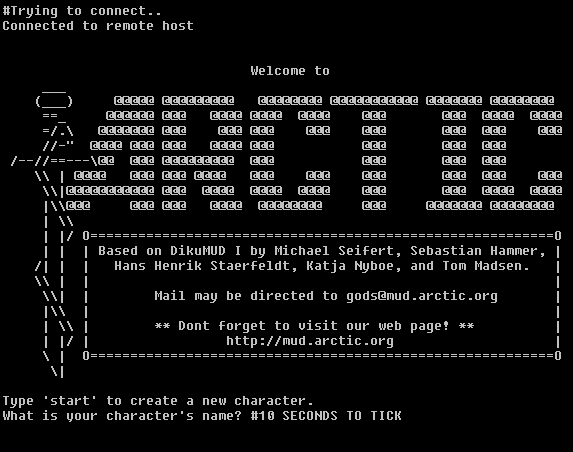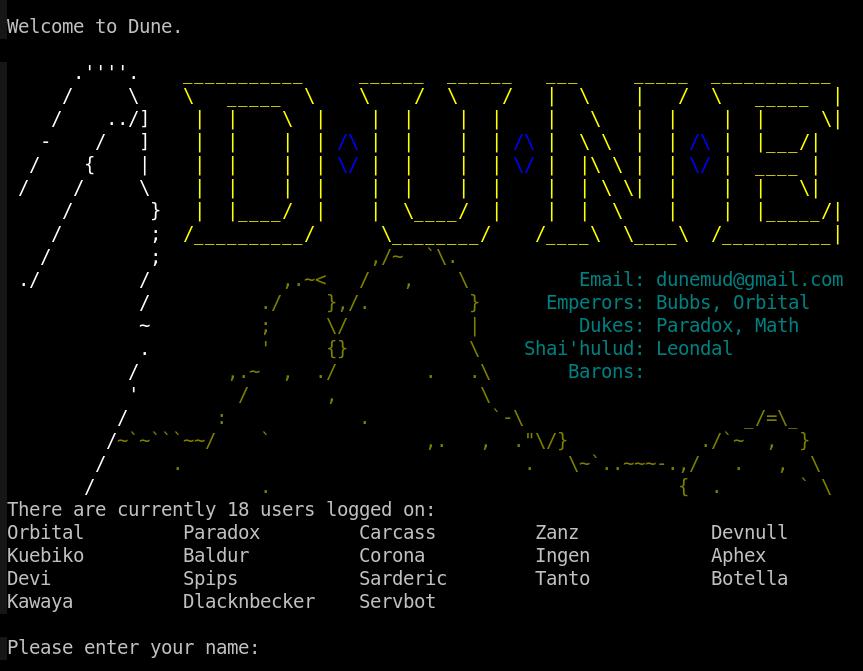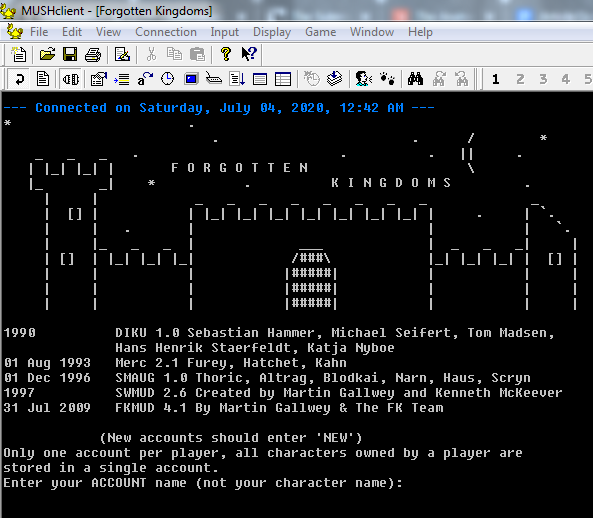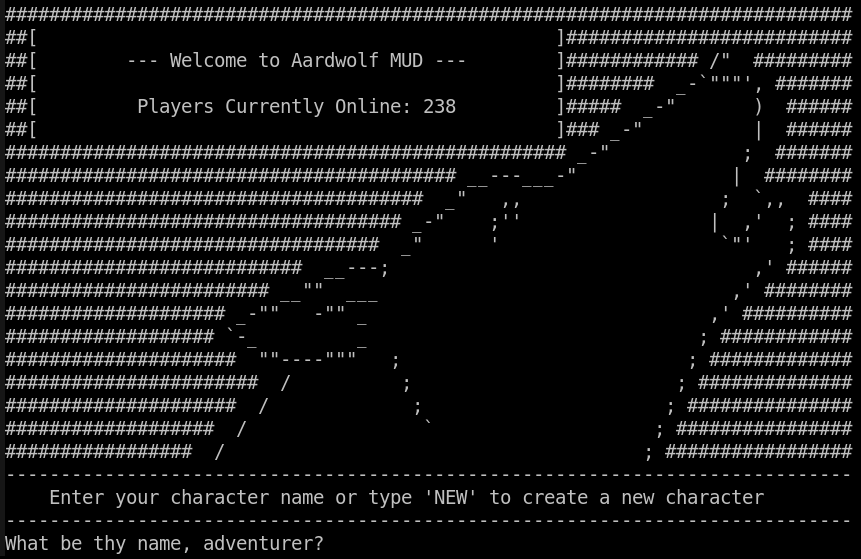
What is a MUD?
The acronym MUD stands for Multi-User Dungeon. It's a type of game that is often text based and more old-school than modern games. Fundamentally there is no real difference between an MMO (massively multiplayer online) game from a MUD, but there are certain expectations of a MUD as they can usually be played solely with the command line and a text console. Some MUDs will even market themselves as "text based MMO" in order to get away from the old and potentially outdated and stagnant MUD title.
So why MUDs?
I believe that MUD-type games are the future startups of the crypto gaming industry that will eventually become killer applications. Everyone in this business is going about it wrong. This is because everyone is deploying WEB2 business models in order to implement WEB3 ideas.
Centralized dev teams create, maintain, upgrade, and ensure the servers are online. This is an extremely centralized model that has yet to be challenged. The players themselves are consumers, which is quite incorrect. That's not how WEB3 works. Players need to be producers and consumers. The centralized pain points need to be removed but nobody has done it yet so there is no template available that are known to work and can be copied by others in a modular fashion. Soon™?

Why are MUDs better?
Crypto networks are multiplayer by default. Not only are these networks and the economy itself defined by having multiple participants, but crypto provides an underlying currency for everything. How many devs actually use the underlying currency provided vs spinning up a new token? Getting the incentives correct and aligning the infrastructure is no easy task.
MUDs are relatively easy to create. The most difficult part is flushing out the world and creating all the lore and quests and everything else. Creating the core skeleton is quite easy, and it is possible to tokenize development using NFTs.
- This would allow the players themselves who enter on the ground floor to participate in the development process; creating the lore and the quests in tandem with the core dev team. These NFTs could then be sold on the market at a later date, redeemed for in-game resources, or even have a contract payout of crypto get unlocked on completion/validation.
The decentralized nature of this kind of development process opens up an endless horizon in terms of scaling. Because the game is no longer bound by a couple of very motivated indie developers: the entire community can contribute to the process in a sustainable way.
- Such an environment allows the game to evolve far beyond the original boundaries. Graphical interfaces could be added after the fact. Spinoff games could be easily forked into a new direction. The sky is the limit when community members can get paid to provide value to the project. How many crypto games today actually employ this strategy? As far as I know the answer is zero.

Why Hive?
Why is Hive the perfect place for this model?
Readable names
It's such a basic but important thing. Hive screennames double as both gamer tags and also cryptocurrency pubkeys that money can be sent to and received from. The ability to scrape the posting-key from every account and use that for security without exposing the active-key (that handles actual money) is a huge security benefit.Communications network
The core of this entire blockchain is a communications network using plain text. This is very useful for any text-based game that can operate from a command line interface. The added security of memo-keys and the ability to send any account an encrypted message directly on/off chain is also a feature that has been woefully underutilized thus far.Custom JSON
The ability to embed native Javascript into any on-chain message is insanely useful. This allows easy integration into webpages and apps alike. Devs and easily use Javascript, Node.JS, Typescript, and even Python if the situation calls for it. These are all relatively easy languages to learn and deploy.Resource Credits
The ability to yield farm bandwidth without having to pay to get information on chain isn't technically required but will almost certainly help for bootstrapping a small project; while overcoming the mental hurdle of needing to spend money just to perform a basic action.

Layer 3 development
As games like Spinterlands have proven the network can get bogged down when a game gains any level of popularity and can flood the network with JSON operations. On Hive we think of JSON as the second layer, as the witnesses never actually validate this type of consensus and Hive is used as a "data availability layer".
At a certain point a lot of data will have to be taken off-chain. We could think of the third layer in a couple of different ways, but I'll define it here as using Hive to import user names and pubkeys for account security while abandoning the JSON model completely... or rather not abandoning JSONs but simply not putting them on-chain anymore in any capacity. It would also be possible to spinoff a side-chain that only validates game data.
There's a lot of room for growth here when we consider that even the cryptographic security that Hive provides is a huge benefit. There's actually MUD enthusiasts in forums and such who ask about cryptography but no one has ever implemented something like that because it's so much extra work. With Hive development this is zero extra work and just comes baked into the cake on the ground floor.

HackMUD
This is a game I just found out about. It was developed in 2016, which sounds like a long time ago but it's actually quite new compared to most popular MUDs because again this type of genre is quite old (more popular in the 1990's).
In any case, the reason why this one caught my interest is that it seems to operate in a way that could help users on Hive learn to code if it was modified with that concept in mind (it also seems to use javascript commands/infrastructure). This is a utility gamification I've been speculating on for a long time, so I might end up buying this game and playing it a bit just to see if it has any good mechanics that can be adapted. Thus far I've only seen a streamer called "PirateSoftware" play it, if you know who that is.
https://www.youtube.com/shorts/59As9QxSzME
Conclusion
It's weird to say out loud because this type of game is no unpopular within the current meta, but I really do believe that MUDs are the future of scalable WEB3 gamification. First the skeleton gets build which should draw in the developers and content creators excited about building. Then that work is tokenized into NFTs and incorporated into the game using the underlying governance model (likely DPOS).
Games or just applications in general created in this way should stand on their own and evolve themselves regardless if the original dev team sticks around or not. We need to create community controlled applications that don't have these centralized pain points we are seeing everywhere else. Easier said than done but the potential value for achieving this goal is infinite.
Posted Using InLeo Alpha